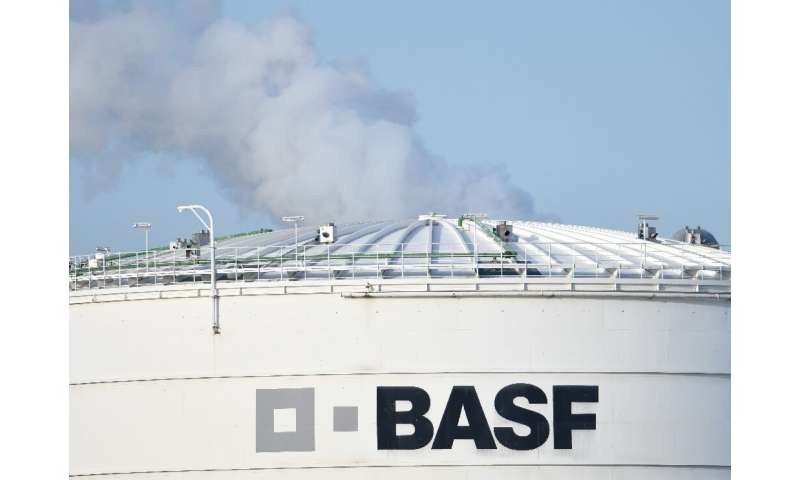
Farmer Bill Bader claimed the companies encouraged farmers to use the dicamba weedkiller irresponsibly
A US jury has awarded $265 million to a Missouri farmer who blamed herbicide from chemical giants Bayer AG and German rival BASF for destroying his peach orchards, in a case set to bolster 140 other lawsuits.
Jurors in federal court in Cape Girardeau, Missouri, made the ruling on Saturday after peach farmer Bill Bader claimed the companies encouraged farmers to use the dicamba weedkiller irresponsibly.
Bloomberg News reported that the case was the first US trial over dicamba herbicide, which is alleged to have wrecked crops across America's Midwest by drifting onto plants that were unable to resist it.
Much like Roundup, another much-criticised herbicide marketed by Monsanto, dicamba has been on the market many years.
Use of the chemical jumped after Monsanto—which was bought by Germany's Bayer in 2018—introduced seeds that can resist the weed-killer.
But the product has been blamed for polluting around four percent of US soybean fields in 2017. A common complaint is that the herbicide spreads to nearby areas.
The fight over dicamba comes in the wake of a case in which Bayer was ordered by a California jury to pay $290 million for failing to warn a dying groundskeeper that Roundup might cause cancer.
In January, reports suggested Bayer could stump up $10 billion in a settlement with tens of thousands of US plaintiffs suffering from non-Hodgkin's lymphoma.

A US jury has awarded $265 million to a Missouri farmer who blamed herbicide from chemical giants Bayer AG and German rival BASF for destroying his peach orchards, in a case set to bolster 140 other lawsuits.
Jurors in federal court in Cape Girardeau, Missouri, made the ruling on Saturday after peach farmer Bill Bader claimed the companies encouraged farmers to use the dicamba weedkiller irresponsibly.
Bloomberg News reported that the case was the first US trial over dicamba herbicide, which is alleged to have wrecked crops across America's Midwest by drifting onto plants that were unable to resist it.
Much like Roundup, another much-criticised herbicide marketed by Monsanto, dicamba has been on the market many years.
Use of the chemical jumped after Monsanto—which was bought by Germany's Bayer in 2018—introduced seeds that can resist the weed-killer.
But the product has been blamed for polluting around four percent of US soybean fields in 2017. A common complaint is that the herbicide spreads to nearby areas.
The fight over dicamba comes in the wake of a case in which Bayer was ordered by a California jury to pay $290 million for failing to warn a dying groundskeeper that Roundup might cause cancer.
In January, reports suggested Bayer could stump up $10 billion in a settlement with tens of thousands of US plaintiffs suffering from non-Hodgkin's lymphoma.

Dicamba herbicide is alleged to have wrecked crops across America's Midwest by drifting onto plants that were unable to resist it
The cancer sufferers say they developed the disease after exposure to glyphosate, the key ingredient in Roundup.
Bayer, which has maintained that dicamba is safe for crops as long as farmers follow instructions, said in a statement it would "swiftly appeal the decision".
Meanwhile BASF said it was "surprised" by the ruling and would "use all available legal resources
The cancer sufferers say they developed the disease after exposure to glyphosate, the key ingredient in Roundup.
Bayer, which has maintained that dicamba is safe for crops as long as farmers follow instructions, said in a statement it would "swiftly appeal the decision".
Meanwhile BASF said it was "surprised" by the ruling and would "use all available legal resources
U.S. peach grower awarded $265 million from Bayer, BASF in weedkiller lawsuit

February 16, 2020

FILE PHOTO: Logo of Bayer AG at a plant of the German
pharmaceutical and chemical maker in WuppertalMore
(Reuters) - A Missouri jury's $265 million award to peach grower Bill Bader in his lawsuit against herbicide providers Bayer and BASF has raised the stakes for the two companies as at least 140 similar cases head to U.S. courts later this year.
A jury in U.S. District Court in Cape Girardeau, Missouri, handed Bader, the state's largest peach farmer, $15 million in actual and $250 million in punitive damages. He sued the companies saying his 1,000-acre orchard was irreparably harmed by herbicide that they produce, which drifted onto its trees from nearby farms.
The three-week trial was the first case in the United States to rule on the use of dicamba-based herbicides alleged to have damaged tens of thousands of acres of U.S. cropland. The herbicide can become a vapor and drift for miles when used in certain weather, farmers have claimed.
(Reuters) - A Missouri jury's $265 million award to peach grower Bill Bader in his lawsuit against herbicide providers Bayer and BASF has raised the stakes for the two companies as at least 140 similar cases head to U.S. courts later this year.
A jury in U.S. District Court in Cape Girardeau, Missouri, handed Bader, the state's largest peach farmer, $15 million in actual and $250 million in punitive damages. He sued the companies saying his 1,000-acre orchard was irreparably harmed by herbicide that they produce, which drifted onto its trees from nearby farms.
The three-week trial was the first case in the United States to rule on the use of dicamba-based herbicides alleged to have damaged tens of thousands of acres of U.S. cropland. The herbicide can become a vapor and drift for miles when used in certain weather, farmers have claimed.
Bayer said it was "disappointed with the jury’s verdict," and plans to appeal. BASF also said it was “surprised and disappointed” by the decision and plans to appeal. Both companies said their dicamba-based herbicides are safe when used as directed.
Bayer faces separate multi-billion-dollar litigation over the Roundup weedkiller made by Monsanto, the U.S. firm it took over for $63 billion in 2018. Monsanto made Roundup and dicamba, and Bayer is being sued over both products.
"We believe the evidence presented at trial demonstrated that Monsanto’s products were not responsible for the losses," Bayer said.
Bayer and BASF face other dicamba lawsuits that could begin late his year before the same judge in Missouri, said attorney Billy Randles, whose firm represented Bader and also represents dozens of others with similar claims.
"These are all the same" allegations, said Randles. "They claim negligent design, failure to warn and all allege a joint venture" between Bayer and BASF. The jury found the two equally liable for the damages.
Bader Farms, in southern Missouri near the Arkansas border, said it lost many trees when the herbicide containing dicamba was used on nearby soybean and cotton farms and drifted onto its property.
The farm said repeated dicamba exposure beginning in 2015 killed or weakened the fruit trees.
The U.S. Environmental Protection Agency imposed restrictions on the use of dicamba in November 2018 over concerns about potential damage to nearby crops.
"As long as dicamba is around, it’s not viable," Randles said of the orchard.
Bayer faces separate multi-billion-dollar litigation over the Roundup weedkiller made by Monsanto, the U.S. firm it took over for $63 billion in 2018. Monsanto made Roundup and dicamba, and Bayer is being sued over both products.
"We believe the evidence presented at trial demonstrated that Monsanto’s products were not responsible for the losses," Bayer said.
Bayer and BASF face other dicamba lawsuits that could begin late his year before the same judge in Missouri, said attorney Billy Randles, whose firm represented Bader and also represents dozens of others with similar claims.
"These are all the same" allegations, said Randles. "They claim negligent design, failure to warn and all allege a joint venture" between Bayer and BASF. The jury found the two equally liable for the damages.
Bader Farms, in southern Missouri near the Arkansas border, said it lost many trees when the herbicide containing dicamba was used on nearby soybean and cotton farms and drifted onto its property.
The farm said repeated dicamba exposure beginning in 2015 killed or weakened the fruit trees.
The U.S. Environmental Protection Agency imposed restrictions on the use of dicamba in November 2018 over concerns about potential damage to nearby crops.
"As long as dicamba is around, it’s not viable," Randles said of the orchard.





No comments:
Post a Comment